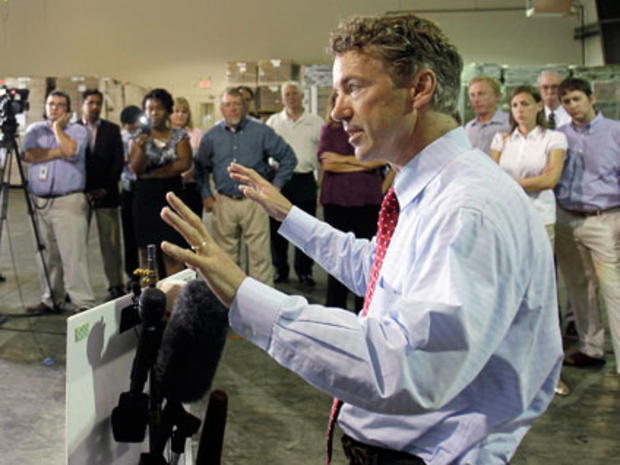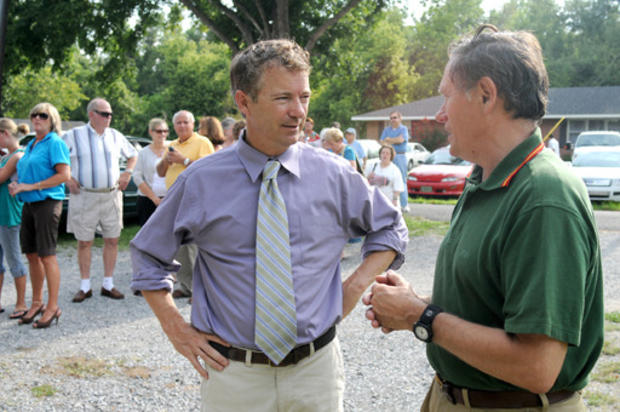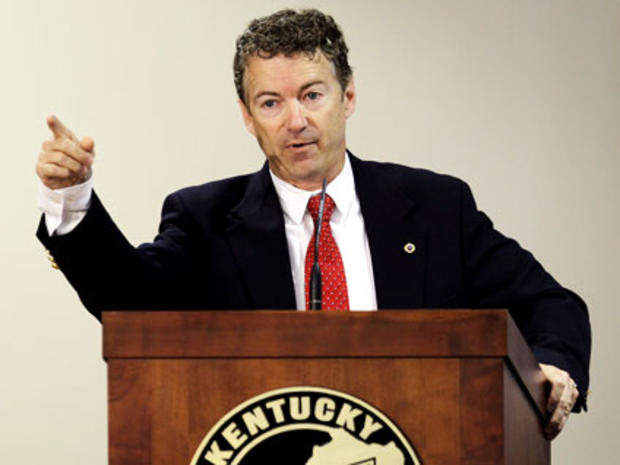Is Rand Paul Still a Tea Partier?
Gone unnoticed in all the debate in recent months over the Tea Party movement has been a striking shift: One of the ostensible champions of the movement has quietly moved, squarely if uneasily, into the GOP establishment.
That Tea Party standard-bearer is Kentucky Republican Senate candidate Dr. Rand Paul, who beat establishment choice Trey Grayson to win the state's GOP primary in May. Before and (to a slightly lesser extent) during the primary, Paul was known as a full-throated, Libertarian-leaning Republican in the style of his father, Texas Republican and former presidential candidate Ron Paul.
The younger Paul unapologetically showed off those views in national media interviews following his primary victory. Asked about the Civil Rights Act of 1964, he suggestedthat while he opposes discrimination, he wasn't convinced the federal government should be telling restaurants who they can and can't serve - if they want to turn away black people, he seemed to be saying, it wasn't the government's job to tell them not to.
Paul soon backed awayfrom that position, but there were other headaches: He suggested the requirement that businesses provide equal access to unemployed Americans (as mandated by the Americans with Disabilities Act) wasn't fair to business owners, and said that President Obama putting "his boot heel on the throat of BP" after the Gulf oil spill was "really un-American." The comments earned Paul characterizations by some in the national media as a Libertarian extremist, as well as nervous comments from fellow Republicans; Arizona Sen. Jon Kyl memorably said Paul was engaged in the sort of debate "you had at 2 a.m. in the morning when you're going to college, but it doesn't have a lot to do with anything."
Critical Contests: Interactive Map with CBS News' Election 2010 Race Ratings
Members of the Republican establishment, meanwhile, started to be asked if they would continue to support Paul. The answer was a qualified yes - so long as he got with the program. "If he'll stick to the jobs, debt and terror and providing a check-and-balance on a runaway government in Washington, he'll be the next Republican senator," Sen. Lamar Alexander said on CBS' Face the Nation. "We'll be glad to have him."
Paul got the message. He stopped showcasing his more Libertarian beliefs in national interviews and moderated his earlier, more controversial positions. Following a mining accident in May, Paul first seemed to dismiss calls for more oversight, saying that "sometimes accidents happen"; by September, however, he was signaling he was open to adding more mine inspectors.
On foreign policy, Paul, like his father, had expressed strong concerns about America's military presence abroad. And while he hasn't repudiated those positions, he has largely stopped talking about them; he said on the campaign trail in July that, "I'm not really thinking about Afghanistan; foreign policy is really a complete non-issue."
There's more: Despite once deeming Medicare "socialized medicine," he opposed reductions in Medicare payments for doctors; he decided to back a fence on the southern border after having previously compared one to the Berlin Wall.
The degree to which Rand Paul had moved in the direction of traditional Republicanism - and away from his perpetual GOP outsider father - was underlined in the split between the two men on the question of the Islamic cultural center that came to be known as the "Ground Zero mosque."
Ron Paul decried "demagogy" on the issue and said it was being used to generate "hatred toward Muslims to rally support for the ill conceived preventative wars." Rand Paul, by contrast, followed other Republicans and said the cultural center should not be built. "The Muslim community would better serve the healing process by making a donation to the memorial fund for the victims of September 11th," he said.
Paul's behavior after that chaotic post-primary week was enough to placate the party establishment. In June, Senate Republican leader Mitch McConnell of Kentucky, who had backed Grayson in the primary, hosted a high-dollar fundraiser for Paul in Washington - despite Paul's earlier pledge not to take money from supporters of the TARP bank bailout, McConnell among them. By September, the National Republican Senatorial Committee was running campaign ads on Paul's behalf.
At left, Nancy Cordes reports on the debate and the race for the CBS Evening News.
It is not uncommon for a candidate to moderate positions following a primary in order to win votes in a general election. But for a Tea Party candidate like Paul - someone whose message was grounded in opposition to the establishment from both parties - it's hard to square his earlier posture with the warm embrace he has received from the establishment.
Paul's campaign manager, Jesse Benton, disputes the notion that Paul has shifted since his primary win.
"The media and liberal elites have spent months trying unsuccessfully to paint Dr. Paul as some sort of extremist," Benton said in response to this story. "It is funny to a see a full reversal to now critique him for being somehow too 'moderate.' The bottom line is, Rand's positions have not changed. His gives the same speeches and holds the same platform now that he did in the primary: balanced budgets, term limits, an end to out-of-control government and real reform in Washington."
Indeed, Paul has continued to stress fiscal conservatism and commitment to smaller government throughout the campaign, and he held a rally with DeMint on Saturday. But he has also talked less and less about the Tea Party, opting at Sunday's debate to his place emphasis, like many other Republican candidates, on tying his opponent to Washington and the policies of President Obama such as cap-and-trade and the stimulus package.
Paul is not the only candidate whose Tea Party views have seemed to soften under the glare of the national spotlight. Consider early Tea Party darling and Florida GOP Senate candidate Marco Rubio - who, it should be pointed out, was never entirely plausible as a Tea Party outsider candidate in the first place, since he had served as Florida House speaker.
While appearing on conservative Laura Ingraham's radio show last year, Rubio signed a pledge in support of partial privatization of Social Security, and he backed private accounts in January and February. Since then, however, he has moved away from that stance, insisting the time to consider private accounts has "come and gone."
A similar retreat was undertaken by Tea Party darling and GOP Nevada Senate candidate Sharron Angle. Angle initially called Social Security a "broken" system that "can't be fixed," and called for it (and Medicare) to be phased out and perhaps replaced by a private system.
She later moved away from those comments, however, claiming she would "like to save Social Security." Angle also claimed last week that she doesn't want to privatize the Department of Veteran's Affairs - despite having pushed for moving toward a "privatized system" in May.
Rubio and Angle's shift away from their strong statements on Social Security, which is known as "the third rail of American politics" for good reason, is not a tremendous surprise. But it does suggest that their Tea Party moorings are somewhat more malleable than their most fervent supporters might prefer.
As for Paul - who once cast himself as part of a "Tea Party tidal wave" - the question going forward is who he will be if he gets to the Senate: An idealistic, Libertarian-leaning antiestablishment figure looking to shake up the system, or a relatively mainstream Republican soldier content to toe the GOP line.
Paul, Conway Face Off in Kentucky Senate Debate
CBSNews.com Special Report: Election 2010
Brian Montopoli is a political reporter for CBSNews.com. You can read more of his posts here. Follow Hotsheet on Facebook and Twitter.



